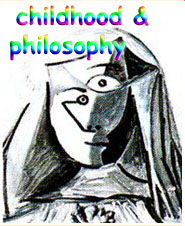collaborative problem-solving and citizenship education: a philosophical escape in the age of competencies
DOI:
https://doi.org/10.12957/childphilo.2019.43269Keywords:
competence, collaborative problem-solving, philosophy for children, citizenship education.Abstract
Starting from the Italian results of the PISA 2015 surveys as regards the competence of young students in collaborative problem-solving, in this paper we conduct a critical analysis of the concept of competence, as seen through the lens of the Capability Approach. The Philosophy for Children curriculum is presented as a pedagogical and didactic proposal capable of re-conceptualizing the constructs of ‘problem-solving’ and ‘collaboration’. In the light of ‘Complex Thinking’ theory and the ‘community of inquiry’ classroom methodology, the general theoretical frame of the PISA and DeSeCo approach to problem-solving has been criticized for its focus on what has been defined in terms of “internal mental structures in the sense of abilities, dispositions or resources embedded in the individual”. The proposal of Philosophy for Children and its ‘community of inquiry’ methodology are considered and discussed. This educational curriculum provides a real opportunity to rethink citizenship education by concentrating on the value and power of collective agency and the ability to wonder about our world. The pedagogical implications are significant because this means that we should be aiming to align academic education not with what society is, but with what it could or should be. To achieve this, education policies and planning actions need to focus on values and principles, on matters such as freedom, social equity and participation. These matters are not exclusive to the realms of individual endowment and performance. They have fundamental ethical and cultural components. Philosophy for Children can be considered as an opportunity to work towards the educational and political goal of creating “flourishing communities”.
Downloads
References
Alkire, S. (2008). Concepts and Measures of Agency (OPHI Working Papers from Queen Elizabeth House, University of Oxford).
Arendt, H. (1998), (first edition, 1958). The Human Condition. Second Edition, Chicago-London: The University of Chicago Press.
Biesta, G. (2010). Good Education in the Age of Measurement. Ethics, Politics, Democracy. London and New York: Routledge.
Biggeri, M., Santi, M. (2012). The missing dimensions of children’s well-being and well-becoming in education systems: capabilities and philosophy for children. Journal of Human Development and Capabilities, 13(3), 373-395.
Bourdieu, P. (1986). The Forms of Capital. New York: Greenwood.
Bourdieu, P., Wacquant, L. (1992). An invitation to Reflexive Sociology. Chicago-London: The University of Chicago.
Bruner, J. (1996). The Culture of Education. Boston: Harvard University Press.
Di Masi, D., Santi, M. (2016). Learning democratic thinking: philosophy for children as citizens, Journal of Curriculum Studies, Vol. 47(6), pp.136-150.
Goleman, D. (1995). The Emotional Intelligence. New York: Bantam Book.
Gould, S.J., Vrba, E.S. (1982). Exaptation – a missing term in the science of form. Paleobiology, 8: 4-15.
Gould, S.J. (1991). Exaptation: a crucial tool for an evolutionary psychology. Journal of Social Issues, 47(3), pp.43-65.
Habermas, J. (1968). Erkenntnis und Interesse, Frankfurt a. Main: Shurkamp.
Hogan, P. (2003). Teaching and learning as a way of life, Journal of Philosophy of Education, 37(2). pp. 207-223.
Ingold, T. (2014). The creativity of undergoing, Pragmatics & Cognition, 22(1), pp.124-139.
Janik, A., Toulmin, S. (1996) (first edition, 1973). Wittgenstein’s Vienna. Chicago: Ivan R. Dee.
Kohan, W. O., Santi, M., Wozniak, J. (2017). Philosophy for teachers: between ignorance, invention and improvisation, In: (Eds): M. R. Gregory, J. Haynes, K. Murris, The Routledge International Handbook of Philosophy for Children. London and New York: Routledge.
Lipman, M. (1995). Caring as thinking. Inquiry. An International Journal of Philosophy. 5(1), pp.1-13.
Lipman, M. (2003). Thinking in Education. Cambridge: Cambridge University Press.
Lozano, J.F., Boni, A., Peris, J., Hueso, A. (2012). Competencies in higher education: a critical analysis from the capabilities approach. Journal of Philosophy of Education, 46 (1), 132-147.
Malabou, C. (2004). What Should We Do with Our Brain? New York: Fordham University Press.
Mead, G.H. (1934). Mind, Self and Society. Chicago: University of Chicago Press.
Nussbaum, M. (2006). Education and democratic citizenship: capabilities and quality education, Journal of Human Development, 7, pp.385-395.
Nussbaum, M. (2010). Not for Profit. Why Democracy Needs the Humanities. Princeton: Princeton University Press.
Polya, G. (1945). How to Solve It. Princeton: Princeton University Press.
Reusser, K. (1986). Problem solving beyond the logic of things. Textual and contextual effects on understanding and solving world problems. Paper presented at the Annual Meeting of the American Educational Research Association, 70th, San Francisco, April 16-20, 1986.
Rychen, D.S., Salganik, L.H. (2003). Key Competencies for a Successful Life and a Well-Functioning Society. Gottingen: Hogrefe and Huber.
Robeyns, I. (2005). The capability approach: a theoretical survey, Journal of Human Development, 6(1), pp.93-114.
Santi, M., Oliverio, S. (2006). Educating for Complex Thinking through Philosophical Inquiry. Models, Advances and Proposal for a New Millennium. Napoli: Liguori.
Santi, M. (2017). Jazzing philosophy for children. an improvising way for a new pedagogy. Childhood & Philosophy, Vo.13, No. 28, 631-647.
Santi, M., Zorzi, E. (2016) (Eds.). Education as Jazz. Interdisciplinary Sketches on a New Metaphor. New Castle: Cambridge Scholar Publishing.
Santi M., Di Masi D. (2014). Pedagogies to develop children’s agency in school, in Saroijni Hart C., Biggeri M., Babic B., Agency and Participation in Childhood and Youth. International Application of the Capability Approach in Schools and Beyond, London: Bloomsbury, pp.123-144.
Sen, A. (1985). Well-being, agency and freedom, Journal of Philosophy, LXXXII (4), pp.169-221
Sen, A. (1999). Development as Freedom. Oxford: Oxford University Press.
Szymborska, W. (2009). La gioia di scrivere. Tutte le poesie (1945-2009). Milano: Adelphi.
Unterhalter, E. (2017). Negative capability? Measuring the unmeasurable in education. Comparative Education, 53(1), pp.1.



